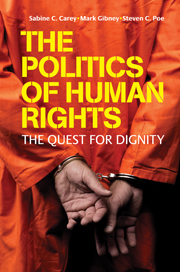Book contents
- Frontmatter
- Contents
- List of text boxes
- List of figures
- List of tables
- List of abbreviations
- Introduction
- Part I Human rights and state responsibilities
- Part II Empirical representations and explanations of human rights violations
- Part III Intervening and rebuilding in the wake of repression
- 6 Intervening to protect human rights
- 7 Rebuilding society in the aftermath of repression
- 8 Towards the future
- Bibliography
- Index
- References
7 - Rebuilding society in the aftermath of repression
Published online by Cambridge University Press: 05 June 2012
- Frontmatter
- Contents
- List of text boxes
- List of figures
- List of tables
- List of abbreviations
- Introduction
- Part I Human rights and state responsibilities
- Part II Empirical representations and explanations of human rights violations
- Part III Intervening and rebuilding in the wake of repression
- 6 Intervening to protect human rights
- 7 Rebuilding society in the aftermath of repression
- 8 Towards the future
- Bibliography
- Index
- References
Summary
‘We cannot have peace of mind if we do not know what happened to our husbands and brothers.’
statement by a wife of a ‘disappeared’ man to an unnamed Amnesty International official.
‘But the truth will not necessarily be believed and it is putting too much faith in truth to believe that it can heal.’
Michael Ignatieff (quoted in Minow 1998: 52)
In the preceding chapter we mentioned Sudan as a ‘forgotten country’. Although a fair amount of publicity has been given to the massive levels of human rights violations that have afflicted this country, no humanitarian intervention has taken place, and the UN peacekeeping force (UNAMID) was strongly rejected by Sudan as a foreign invasion. Still, some day the violence will stop and soon thereafter the world's attention will turn to another crisis. However, efforts to bring truth, justice and a stable government to Sudan in these difficult circumstances will most assuredly not be given anywhere near the same level of attention by the world's media as putting an end to the physical violence. Yet achieving these goals is vital to the long-term prospects for peace, and arguably this will be a much more difficult and a much more complicated undertaking than stopping physical violence.
In this chapter we focus on the way in which countries that have suffered gross human rights violations attempt to deal with their past. How can society be rebuilt and made functional in the wake of such abuses?
- Type
- Chapter
- Information
- The Politics of Human RightsThe Quest for Dignity, pp. 196 - 223Publisher: Cambridge University PressPrint publication year: 2010

